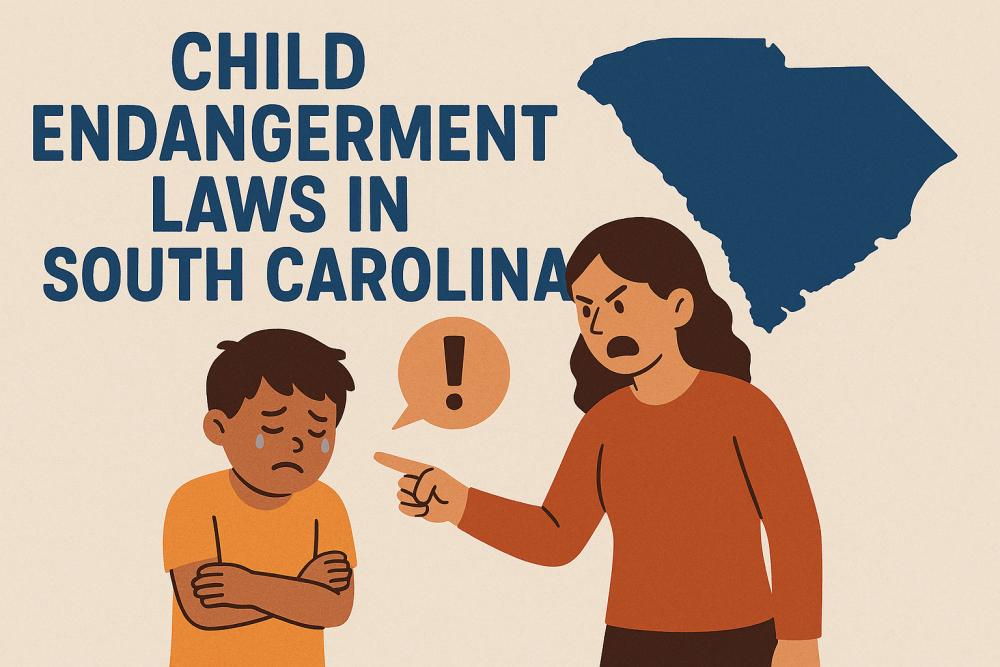Child Endangerment is a serious criminal offense in South Carolina that can lead to harsh penalties, including jail time, fines, and even loss of parental rights.
If you have been accused of endangering a child—whether due to a DUI with a minor in the car, alleged neglect, or exposure to hazardous conditions—it is essential to understand the law and explore all possible defenses.
At Seaton & Duncan, we know how overwhelming these charges can be. Our legal team has successfully defended clients in Berkeley County, Dorchester County, Charleston County, North Charleston, Goose Creek, Jamestown, Summerville, Ridgeville, Mount Pleasant, Folly Beach, Moncks Corner, Hanahan, St. George, and surrounding areas.
If you or a loved one is facing child endangerment allegations, we are here to protect your rights and your future.
What is Child Endangerment in South Carolina?
South Carolina law defines child endangerment as any action that places a minor at risk of harm or exposes them to dangerous conditions.
The specific charges depend on the nature of the allegations.
Child Endangerment Charges in South Carolina
1. Child Endangerment and DUI (S.C. Code § 56-5-2947)
One of the most common child endangerment charges occurs when an individual is arrested for Driving Under the Influence (DUI) with a child passenger.
Under S.C. Code § 56-5-2947, it is illegal to operate a motor vehicle under the influence of alcohol or drugs if a minor under the age of 16 is in the car.
Penalties for DUI-related child endangerment include:
- First Offense: A fine of up to $1,000 and additional jail time beyond the underlying DUI penalties.
- Subsequent Offenses: Increased fines, longer imprisonment, and more severe consequences.
2. General Child Endangerment Laws (S.C. Code § 63-5-70)
Under S.C. Code § 63-5-70, parents, guardians, or caregivers can face child endangerment charges if they place a child at unreasonable risk of harm due to reckless or negligent actions.
Examples include:
- Leaving a child in a dangerous environment, such as a home with illegal drugs, firearms, or abusive individuals.
- Failing to provide basic necessities, including food, shelter, and medical care.
- Engaging in reckless behavior that could result in serious harm to a child.
3. Unlawful Conduct Toward a Child (S.C. Code § 63-5-80)
A more severe charge, Unlawful Conduct toward a Child, applies when a parent, guardian, or caregiver willfully places a child in substantial danger.
This charge often involves physical abuse, extreme neglect, or exposing a child to serious harm.
This offense is classified as a felony and carries up to 10 years in prison upon conviction.
Penalties for Child Endangerment in South Carolina
The penalties for Child Endangerment vary depending on the severity of the charge:
- DUI-related Child Endangerment results in additional jail time and fines on top of the DUI penalties.
- General Child Endangerment (S.C. Code § 63-5-70) is often a misdemeanor, but aggravated cases may be prosecuted as felonies.
- Unlawful Conduct Towards a Child (S.C. Code § 63-5-80) is a felony punishable by up to 10 years in prison.
Beyond criminal penalties, a conviction can also impact child custody, visitation rights, and future employment opportunities. Convicted individuals may also be required to complete parenting classes and be placed on South Carolina’s child abuse registry.
Possible Defenses to Child Endangerment Charges
At Seaton & Duncan, we carefully examine the details of each case to build the strongest possible defense. Some potential defenses to child endangerment charges include:
1. Lack of Intent or Knowledge
Prosecutors must prove that the defendant knowingly or recklessly endangered a child. If there was no intent or awareness of the alleged danger, this could be a valid defense.
2. False Allegations
Unfortunately, false accusations of child endangerment often arise in divorce or custody battles. If there is evidence that the charges are based on false claims, we will challenge the prosecution’s case.
3. Insufficient Evidence
The prosecution must prove beyond a reasonable doubt that child endangerment occurred. If no reliable evidence exists—such as no eyewitness testimony or medical records—we may seek to have the charges dismissed or reduced.
4. Justified Actions or Emergencies
If a parent or guardian acted out of necessity or in an emergency to protect the child, this could serve as a valid defense. For example, leaving a child alone briefly due to a medical emergency may not meet the threshold for criminal endangerment.
What to Do If You Are Charged with Child Endangerment
If you are facing child endangerment charges in Berkeley County, Charleston County, Dorchester County, or a surrounding county, you must act quickly to protect your rights. Here’s what to do:
- Do not speak to police without legal representation. Anything you say can, and will, be used against you.
- Document any evidence that supports your side of the story, including witness statements and medical records.
- Contact a criminal defense attorney immediately to discuss your options.
Need Help With Your Child Endangerment Charge in SC?
At Seaton & Duncan, we understand how devastating child endangerment charges can be. Our legal team has extensive experience defending clients in Charleston, Berkeley, and Dorchester counties, and we are committed to protecting your rights.
We take a strategic and aggressive approach to every case, ensuring that you receive a fair defense and the best possible outcome. Whether you are facing a misdemeanor or a felony charge, we will fight to protect your freedom and your future.
If you or a loved one is facing child endangerment charges in South Carolina, don’t wait to get legal help. Contact Seaton & Duncan today for a confidential consultation.
Call 843-761-3840 or fill out our online contact form to speak with an experienced criminal defense attorney.
Ready To Speak With An Attorney?
Let’s discuss the details of your case and see if we can help.

